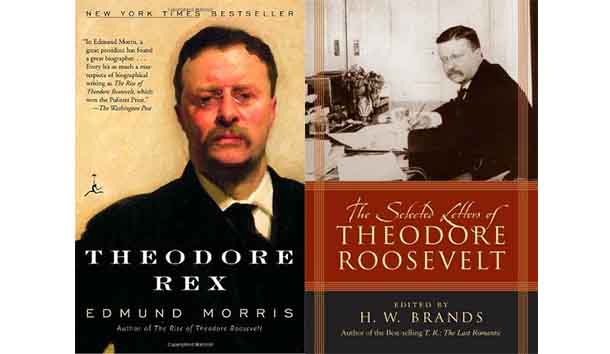Theodore Roosevelt, Jr., was the first of our Northeastern rich-boy presidents, blazing a trail for his kinsman Franklin, John F. Kennedy, and the two Bushes. Even Nelson Rockefeller, who had no abilities and no popularity that was not bought and paid for, ended up a heartbeat from the executive mansion. TR was also the first president to market himself as a personality. A colorful and energetic man, head of the U.S. government at the dawn of the 20th century and at the high tide of the “Progressive” era, he played a decisive role in the creation of the America that we inhabit today.
If you are one of those who suffer from that strange, widespread American folk delusion that presidents are intrinsically interesting and that their daily thoughts and actions are subject for retelling, then Theodore Rex is the book for you. His administrations (1901-1909) are given a thoroughly researched account at the level of good popular history or journalism. Many readers will appreciate the close look not only at Roosevelt but at many other public characters of the period.
The author is, to my taste, a bit too eager to prove Roosevelt right on every occasion. He wants us to accept TR as an early racial liberal, a characterization he supports by giving a few incidents greater importance than they had at the time. Roosevelt was, after all, a believer in the White Man’s Burden. And if he behaved more generously toward black people than many at the time were willing to do, that was not a terribly unusual thing.
I thought I knew a good deal about TR already, yet I only truly began to understand the man by perusing H.W. Brands’ collection of selected letters. Though I would like to have seen a little more information about his editorial practices, Brands has chosen an interesting and seemingly representative sample of private correspondence written by Roosevelt from the age of ten until his death, as he stood chafing on the sidelines of World War I.
By “private,” the editor does not mean merely personal but something expressive of private thoughts, often about public matters, and even philosophical waxings. Though somewhat hampered by wealth and a Harvard education, TR really tried to understand, and act constructively in, the world that existed. His motives were consistent—he desired constructive reform to adjust to new conditions without destructive radicalism. Whether his actions were appropriate to his goals is doubtful. His “trust-busting,” for instance, was certainly made in ignorance of economics (though, come to think of it, ignorance of economics might be an advantage in economic-policy decisions).
Perhaps inevitably for a man of intense action, Roosevelt did not grow very much intellectually, but he kept learning. A 1906 letter to his friend Owen Wister, on the subject of Wister’s novel Lady Baltimore, shows a man reading and thinking with some range, if not much depth. Neither FDR nor JFK could have written such a letter. Teddy Kennedy and George W. Bush would not even understand it. The great flaw of monarchy is that dynasties run down, and our American royals are no exception.
The Progressive Era was the seedbed for the century that followed. It is an endlessly fascinating and multifarious bit of history that could well occupy a lifetime of study. Nearly every controlling assumption and policy of today was formulated or anticipated in Progressive thinking or in its natural culmination, American intervention in World War I. I suspect that TR would be pleased with the American empire of today, except for its multicultural aspect. (Multiculturalism was invented in the 1930’s by European totalitarians.)
For me, the most important question that an historian can bring to the period is why the United States abandoned all its traditions and vigorously entered into the imperial competition for the regulation of the globe. The imperial impulse led Theodore Roosevelt, qua historian, to write silly books that portrayed the Southwestern frontiersmen of the pioneer period as forerunners of the imperialists who wanted to dominate China. (His books were not nearly as silly as Woodrow Wilson’s non-books, however. Wilson had a Ph.D. and was a professional educator.)
We can explain American entrance—frequently enthusiastic entrance—into the hideous world power scramble and the insane mayhem of the European war in many ways. Big banking interests and the dishonesty and shallowness of politicians no doubt played a part (as they do in every significant public question), but that alone is not, I believe, a sufficient explanation.
As far as I can tell, the American people never wished for their government to become the world’s policeman. It was the ruling class that longed to intervene, whether they were, according to Joseph Stromberg’s apt classification, cooperative imperialists like Wilson or unilateral imperialists like Henry Cabot Lodge. Something—an aggressive sense of nationalism (that replaced patriotism), reasonable or unreasonable fear of the other armed powers of the world, a perverted Calvinist impulse to correct unrighteous nations—made the American ruling class leap enthusiastically into the fiery doom of worldwide war.
Reading the letters of Theodore Roosevelt gives some insight into the mindset of the folks who made that critical choice, the ultimate expression of which we are now perhaps seeing in the imperial “New World Order.” They give some insight, but they do not really explain. Perhaps the explanation is simply that power corrupts, and what corruption can be more tempting than the dream of benevolent global command?
[Theodore Rex, by Edmund Morris (New York: Random House) 772 pp., $35.00]
[The Selected Letters of Theodore Roosevelt, edited by H.W. Brands (New York: Cooper Square Press) 656 pp., $32.00]

Leave a Reply